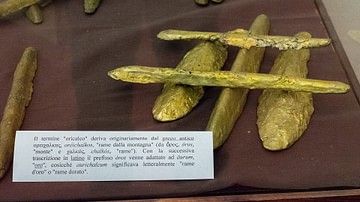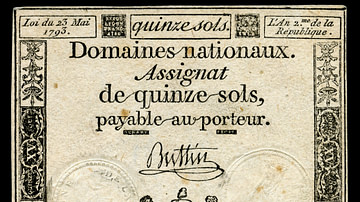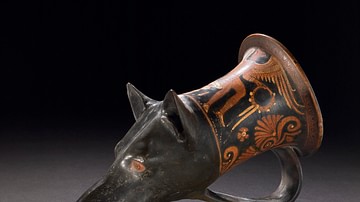Search
Did you mean: Midas?
Search Results

Definition
Orichalcum
Orichalcum ("mountain copper") or aurichalcum ("gold copper") was a metal used in coins during ancient times. Orichalcum was a golden-yellow coloured mixture consisting of both copper and zinc and referred to as brass. The Romans were the...

Article
Foreign Influences & Imported Luxuries in Thrace
Defining Thracian art is a difficult task due to the fact that what we call today Thrace was never a single unified state but, rather, a collection of many independent communities (or tribes) who formed both alliances and rivalries with each...

Article
The Steel Industry in the British Industrial Revolution
The production of steel during the British Industrial Revolution became cheaper and more reliable thanks to the Bessemer converter, a type of blast furnace that removed undesirable impurities from pig iron. The superior strength and durability...

Article
The Gold of the Conquistadors
The staggering quantity of gold the conquistadors extracted from the Americas allowed Spain to become the richest country in the world. The thirst for gold to pay for armies and gain personal enrichment resulted in waves of expeditions of...

Article
The Invention of the First Coinage in Ancient Lydia
Money may take many forms, from the digital code of cryptocurrency to the woodpecker scalps favoured in early California. People have also used cattle, cacao beans, cowrie shells, chewing gum, grain, and giant stones as money. Early cultures...

Definition
Assignat
The assignat was a paper bill issued by France between 1789 and 1796, during the French Revolution (1789-1799). First issued in the form of bonds, the assignat was meant to stimulate France's economy as a quick means to pay off national debt...

Definition
SS Great Britain
The SS Great Britain was a steam-powered ship designed by Isambard Kingdom Brunel (1806-1859) which sailed on its maiden voyage from Liverpool to New York in May 1845. It was the largest passenger ship in the world at the time and showed...

Article
The Gold Trade of Ancient & Medieval West Africa
West Africa was one of the world's greatest producers of gold in the Middle Ages. Trade in the metal went back to antiquity but when the camel caravans of the Sahara linked North Africa to the savannah interior, the trade really took off...

Article
Weapons of the Conquistadors
The Iberian conquistadors ("conquerors") were the first military men to explore, attack, and conquer territories in the Americas and Asia that would then become a part of the Spanish or Portuguese Empire. Indigenous peoples could not match...

Article
Dogs & Their Collars in Ancient Greece
Dogs in ancient Greece are regularly depicted in art, on ceramics, in literature, and other written works as loyal companions, guardians, hunters, and even as great intuitive thinkers; all of these expressing the deep admiration the Greeks...